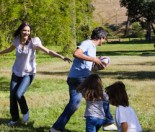Soccer is commonly known as football around the world, but whatever the name, soccer is one of the biggest participation sports for New Zealand kids.
What is Soccer?
Soccer of some description has been played for centuries but the modern game originated in England during the Middle Ages. The game was introduced to New Zealand in the late 19th century by the British and the New Zealand national team has played internationally since 1904.
The national team became known as the All Whites in 1981; this is because of the white shirt, shorts and socks they wear when they play, and is a contrasting play on a rival sporting code with national team the All Blacks,
The adult version of soccer is played by two teams of 11 people, for 45 minutes in each half, and features a round ball, a referee, a field ranging from 100 – 110 metres long and 64 – 75 metres in width, and two goals with a net joining the posts and crossbar.
For kids, the duration of each game, the number of people in each team, the size of the field and goals are changed to suit the different ages and levels of abilities so that they can enjoy the game. This is also to help in the development of the kids as they grow and progress through the different age grades.
The aim of the game is to put the ball between the posts primarily using your feet or head, with the goalkeeper being the only player able to use their hands.
Soccer is a game that requires a high level of fitness, speed, intelligence, skill and the ability to be a team player. Soccer is traditionally a male sport but since the 1970s a New Zealand women’s team has played and the game is gaining popularity among women and girls of all ages.
Where do you play Soccer?
Soccer is the biggest participation sport for New Zealand children with most kids playing for a local club or their primary school at weekends. Some primary and intermediate schools have regular competitions for their teams, but most kids play for their local clubs until they move on to secondary school.
Most secondary school students play for their school, but may also still play for their local club. It is possible to play for both in some areas of New Zealand. This can be confirmed when you talk with your school or local club.
What age can your child start Soccer?
Kids can start to play and learn about soccer in the year they turn five, either at their school or their local club. The local club normally has programmes in place to introduce parents and kids to the sport of soccer.
Teams at this age are usually five-a-side and play on fields as small as one-eighth of a full-size field and play up to 30 minutes in total. As the children grow older the number of players on the field increases to the standard 11-a-side and eventually to a full size pitch. The game time also increases to the maximum 90 minutes in length.
Most children start playing soccer at around six or seven but it is never too late to start. All clubs make beginners feel welcome and cater for the kids just starting out.
How do you progress over time?
As kids get bigger, faster and fitter, they progress through the grades from 6th through to 15th grades, with youth grades taking over from this point onward:
| Age | School | Team Size | Field | Time |
| Under 6 | Year 1 | 5 | One-eighth | 2×13 mins |
| Under 7 | Year 2 | 5 | One-sixth | 2×13 mins |
| Under 8 | Year 3 | 7 | One-quarter | 2×13 mins |
| Under 9 | Year 4 | 7 | One-quarter | 2×18 mins |
| Under 10 | Year 5 | 11 | Three-quarter | 2×25 mins |
| Under 11 | Year 6 | 11 | Three-quarter | 2×25 mins |
| Under 12 | Year 7 | 11 | Full field | 2×27 mins |
| Under 13 | Year 8 | 11 | Full field | 2×27 mins |
| Under 14 | Year 9 | 11 | Full field | 2×27 mins |
| Under 15 | Year 10 | 11 | Full field | 2×35 mins |
The clubs with a lot of kids at the junior level play internal club-based competitions on Saturdays but some of the children have the opportunity to play for the club against other clubs in the area. They may also have the chance to play for their club against other clubs in annual competitions or one-off tournaments during the season.
As most kids play for their high school from Year 9, they can progress through the age group teams of each year with the top three teams at school known as the 1st XI (eleven), 2nd XI and 3rd XI.
Kids may decide to play for a club and most clubs have under-15, under-17 and under-19 teams that fulfill the needs of kids who either don’t want to play for their school or want to play both and take the sport more seriously than others.
Throughout high school, kids can aspire to play for their regional and national school teams and take place in tournaments and competitions.
After high school, clubs provide under-21 and a wide variety of other senior sides for players who are still interested in playing the sport.
They can ultimately aspire to national teams, including the All Whites and New Zealand women’s side. There is no minimum age for joining these teams; in fact, Steven Old made his debut for the All Whites at the age of just 18.
What gear do you need for Soccer?
The gear that is needed to play soccer is not extensive but consists of the following:
- Soccer boots: can be found at any sports stores throughout New Zealand. Most mini soccer teams play in trainers or sand shoes.
- Soccer socks: in the colours of the school or club. They are either purchased from the club/school or a local clothes retailer.
- Soccer shorts: in the colours of the school or club. Again, they are either purchased from the club/school or a local clothing retailer.
- Team shirts: are supplied by clubs and returned at the end of the season. But at schools you are expected to purchase a team shirt from the school or local clothing retailer.
- Shin pads: are a compulsory item to protect the shins of kids from bumps and bruises and can be purchased from sports stores.
- Optional items: a mouth guard, sports bag, drink bottle, practice ball. These items can be purchased from sports stores.
How much does Soccer cost?
Below is an estimate of the cost that you could expect for a primary school age child playing soccer for a season: Please note that these are estimated costs and will vary from club to club.
| Item | Cost |
| Club membership for year | $70.00 |
| Boots- 1 pair | $40.00 |
| Socks- 1 pair | $12.00 |
| Shorts- 1 pair | $25.00 |
| Shin pads- 1 pair | $15.00 |
| Mouth guard- 1 | $8.00 |
| Practice ball | $20.00 |
| Total Cost | $190.00 |
The membership is the only annual fee, most of the equipment and gear should last at least two years. Of course there will also be associated travel costs, but these will vary greatly on how far afield you may need to travel each week.
How much time does Soccer take to learn?
For the majority of children there will be one practice and one match every week. Junior games are primarily played on Saturday morning although some can be played on Saturday afternoon or Sunday, while practices are on a weekday after school.
During the school holidays, games are not normally scheduled on the middle weekend. Local competition coordinators can confirm the schedule of games. Training is usually one to two hours long, but varies depending on age.
The soccer season runs over winter from late April until the middle of September. There are 18 weekly games, though this can be fewer if the weather forces cancellations.
There may also be one or two club competitions each year which, for primary school age children, may take an entire Saturday or Sunday.
Great Soccer Websites
The Small Whites website is dedicated to the youth of New Zealand soccer. It features coaching tips and material about the Small Whites programme.
The official site of the All Whites and New Zealand Soccer. This site is packed full of information and news about New Zealand Soccer, particularly national senior and age group sides.
The International Football Federation Association website. It features lots of news and information about the game around the world and includes the world rankings.
The official website for the Oceania Football Confederation. The organisation that administers and helps coordinate football within the Pacific Islands region, including NZ.







I played soccer since I was 6 I really didn’t know that it was called kiwi but if I could have gone to Europe if I had wanted to. I really did want to go to Europe and play but things weren’t right in the nation and I didn’t really want to make a finacial jump at the time but it is good to know that it is called kiwi. It really helps to know the game. Plus soccer is fun you can play it all day.